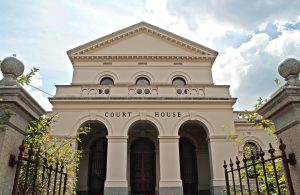 In this series, we provide different perspectives on religion and judging. Five contributors, academics and a U.S. federal judge explore religious diversity and the judiciary, interplays between religious convictions and judicial ethics, and the role of religion and religious beliefs in professional and personal biographies of judges.
In this series, we provide different perspectives on religion and judging. Five contributors, academics and a U.S. federal judge explore religious diversity and the judiciary, interplays between religious convictions and judicial ethics, and the role of religion and religious beliefs in professional and personal biographies of judges.
The series starts with Jeremy Patrick’s elaboration on interplays between religious diversity and the composition of the High Court of Australia. David G. Campbell discusses public concerns about possible tensions between religious adherence and the judiciary oath and argues that religious devotion can be consistent with good judging. Based on the examples of Israel and Egypt, Andrea Pin demonstrates how judges’ religious law-illiteracy can give a secular push to legal systems with the religious component.
Based on the example of the South African Supreme Court’s Chief Justice Mogoeng Mogoeng, Christine Venter addresses the obligation of judges to separate their personal religious convictions and the legal reasoning they provide in their decisions. David Kenny explores the biography of Brian Walsh, a prominent Irish justice and a judge of the Strasbourg Court, and the role his Catholic background plays in his jurisprudence.
Finally, Adelaide Madera returns to the composition of the judicial branch in religiously pluralist societies and explains why, in her view, a more inclusive judiciary would contribute to the social acceptability of judicial reasoning.
Posts in the Series:
Jeremy Patrick. Fair Reflection of Religious Affiliation and the High Court of Australia
David G. Campbell. Is Religious Devotion Consistent with Good Judging?
Andrea Pin. Religious Rulings and Nonreligious Judges: The Importance of Legal Education
Christine Venter. What South Africa Doesn’t Need in a New Chief Justice: One Who Will Bring Religion into the Public Sphere
David Kenny. Mr. Justice Brian Walsh, the Natural Law, and Irish Catholicism
Adelaide Madera. Taking Judges’ Religion Seriously: Some Reflections Based on U.S. and Italian Cases
